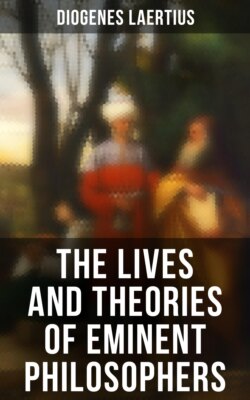Читать книгу The Lives and Theories of Eminent Philosophers - Diogenes Laertius - Страница 44
На сайте Литреса книга снята с продажи.
ОглавлениеDrink now, O Socrates, in the realms of Jove,
For truly did the God pronounce you wise,
And he who said so is himself all wisdom:
You drank the poison which your country gave,
But they drank wisdom from your godlike voice.
XXV. He had, as Aristotle tells us in the third book of his Poetics, a contest with a man of the name of Antiolochus of Lemnos, and with Antipho, an interpreter of prodigies, as Pythagoras had with Cylon of Crotona; and Homer while alive with Sagaris, and after his death with Xenophanes the Colophonian; and Hesiod, too, in his lifetime with Cercops, and after his death with the same Xenophanes; and Pindar with Amphimenes of Cos; and Thales with Pherecydes; and Bias with Salarus of Priene; and Pittacus with Antimenides; and Alcæus and Anaxagoras with Sosibius; and Simonides with Timocreon.
XXVI. Of those who succeeded him, and who are called the Socratic school, the chiefs were Plato, Xenophon, and Antisthenes: and of the ten, as they are often called, the four most eminent were Æschines, Phædo, Euclides, and Aristippus. But we must first speak of Xenophon, and after him of Antisthenes among the Cynics. Then of the Socratic school, and so about Plato, since he is the chief of the ten sects, and the founder of the first Academy. And the regular series of them shall proceed in this manner.
XXVII. There was also another Socrates, a historian, who wrote a description of Argos; and another, a peripatetic philosopher, a native of Bithynia; and another a writer of epigrams; and another a native of Cos, who wrote invocations to the Gods.
